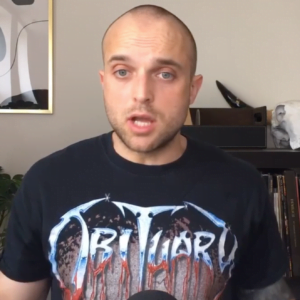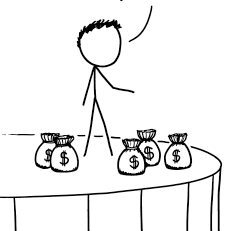If you can’t tell, that picture above is me hanging loose with my audiobook version of “Getting Things Done” by David Allen.
I’m obviously someone who is interested in and obsessed with systems, so, when I first read this book in probably 2009, I immediately implemented many of the strategies and tactics recommended.
This was relatively easy for me since it immediately lined up with my natural way of thinking of things. Want me to create an elaborate mental model and sort and categorize various items within that model? Sounds like a great time – please sign me up immediately.
(I’m also good at sorting recycling and knowing the various rules about what can and can’t be recycled.)
I recently re-read Getting Things Done as part of my obligations for a book club that includes my business partners at South Loop Strength & Conditioning, and I realized I had gotten sloppy with a few key areas and I had simply failed to implement others.
Also, my life as a business owner has put me in a situation where I will always have a never-ending to-do list – which is a totally different psychological space than a person working a part-time job and spending a lot of time working on music (which was my life situation when I first read the book).
I put together a nice little cast laying out some of my biggest takeaways from my re-read of the book – which was probably one of the best and most well-timed re-reads of my life.
Listen Here
- iTunes
- Overcast
- Google Play
- mp3
- Or stream here:
Resources and Individuals Mentioned
- David Allen
- “Getting Things Done” by David Allen
- “The Effective Executive” by Peter Drucker
- Toodledo
- South Loop Strength & Conditioning
- Asana
- Evernote
- OmniFocus
- Zapier
- Pareto Principle
- Legion Strength & Conditioning
- Like Rats
- Decision Fatigue
- “Paradox of Choice” TED Talk by Barry Schwartz
Show Notes
- [0:50] The purpose of to-do lists: Don’t forget stuff and prioritize the stuff that you have written down. Most people think they’ll remember (they won’t) or they have endless, unprioritized lists that are numbing to look at.
- [4:11] Effectiveness, prioritization, and efficiency – These are all different but are all key to long-term success and completion of projects
- [5:52] At some point in my life, I had more to do at any given time than I could ever realistically accomplish. This leaves me with a constant sense of unease, but I’m getting better.
- [9:36] One of David Allen’s most crucial insights is thinking of tasks as “next actions” rather than nebulous projects like “dentist” or “redesign website”
- [15:35] Capturing tasks vs Processing tasks vs Prioritizing tasks vs Executing tasks (All are slightly different and all require different mental states and amounts of cognitive energy)
- [21:25] The necessity of creating a frictionless inbox for capturing tasks – without having to categorize them at the same time
- [23:01] The necessity of creating completable projects (ie “redesign layout of workout of the day blog posts”) vs amorphous categories (“Legion website redesign”)
- [25:38] Protect your calendar and your daily to-do list. Don’t allow everything you might “like to do” to end up cluttering your list of “must dos” for a given day.
- [28:53] Don’t just “buckle down” or “try harder” – learn how your psychology works and set yourself up for success






One Response